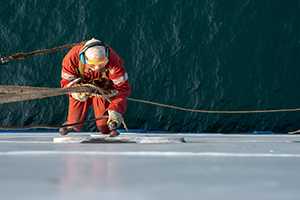Jones Act Claims

Working at sea comes with real dangers. Slippery decks, unpredictable weather, and heavy machinery create daily hazards that can leave even the most experienced seamen injured and unable to work. Fortunately, the Jones Act gives maritime workers unique rights that do not exist in ordinary land-based jobs. It allows injured crew members to hold their employers accountable for unsafe conditions and recover money for both financial and personal losses.
At Friedman Rodman Frank & Estrada, we have represented maritime workers throughout South Florida since 1976. Our team understands the Jones Act inside and out—how it protects seamen, what evidence proves negligence, and how to recover full compensation after a serious injury. If you are searching for the best Miami Jones Act lawyer to guide you through this specialized process, we can help.
What Makes the Jones Act Different?Unlike traditional workers’ compensation systems, the Jones Act gives seamen the right to sue their employers for negligence. If a company’s failure to provide safe equipment, training, or procedures played any part in an injury, even a small one, you can bring a claim. The law’s “featherweight” burden of proof recognizes that life on the water involves constant risk—and ensures that employers take safety seriously.
This protection also works alongside your right to maintenance and cure, a maritime benefit that provides daily living expenses and medical treatment until you reach maximum medical improvement. Together, these laws form the backbone of a seaman’s safety net.
Who Does the Jones Act Protect?Not every maritime worker qualifies as a seaman under the Jones Act. To be eligible, you must spend a substantial portion of your work time on a vessel or fleet in navigation, contributing to its mission. That includes tugboat deckhands, cruise ship crew, ferry workers, dredge operators, offshore engineers, and others directly involved in vessel operations.
Workers who spend most of their time on shore—like longshoremen, stevedores, and shipyard repair personnel—are usually covered by the Longshore and Harbor Workers’ Compensation Act (LHWCA) instead. Choosing the right path matters, since it determines whether you receive fixed benefits or full negligence damages. Our attorneys help you determine which category best fits your duties, preventing costly classification errors.
The Types of Maritime Injuries We HandleMaritime work demands strength, skill, and long hours in unpredictable conditions. Our clients often suffer injuries such as:
- Back, neck, and spinal trauma from heavy lifting or hard impacts
- Broken bones, crush injuries, and amputations caused by machinery or cables
- Concussions and traumatic brain injuries from falls or shifting cargo
- Burns from engine room explosions or hot liquid spills
- Shoulder, knee, and joint injuries from repetitive strain or sudden motion
- Chronic pain, nerve damage, and hearing loss from vibration and noise exposure
While some of these injuries appear immediately, others develop over time. The Jones Act allows recovery for both sudden accidents and cumulative trauma caused by unsafe practices or defective equipment.
Proving Negligence at SeaThe success of a Jones Act claim depends on evidence—proof that the employer’s negligence contributed to the injury. Our attorneys investigate every angle, from crew training and maintenance logs to safety manuals, weather reports, and witness statements.
We often consult maritime engineers, accident reconstructionists, and medical specialists to show exactly how a hazard could have been prevented. Even when an employer insists that rough seas or “bad luck” caused the injury, strong documentation can demonstrate where safety procedures failed.
How the Jones Act Interacts With Other Maritime LawsMany injured seamen also have claims for unseaworthiness under general maritime law. This doctrine requires vessel owners to maintain ships that are reasonably fit for their intended use. A vessel may be unseaworthy if its equipment is defective, its crew is untrained, or its deck conditions are unsafe.
Additionally, families of seamen killed in service may pursue wrongful death and survival claims under the Jones Act and related statutes. These cases can involve complex questions of jurisdiction, vessel ownership, and international law—especially for cruise or cargo ships operating beyond U.S. waters.
Calculating Fair CompensationJones Act damages go far beyond simple medical reimbursement. A successful claim may include:
- Medical expenses, both current and future
- Lost wages and loss of future earning capacity
- Pain, suffering, and loss of enjoyment of life
- Disfigurement, disability, or mental distress
- Loss of household services or support for dependents
In extreme cases, punitive damages may be available when an employer willfully refuses to pay maintenance and cure. We work with life-care planners and economists to ensure every dollar of your loss—financial and human—is documented.
Why Local Representation MattersSouth Florida is one of the busiest maritime regions in the country. Cruise ships, cargo carriers, tugboats, and offshore service vessels leave Miami and Fort Lauderdale ports daily. Each of these operations follows different safety protocols and employs crews under varying contracts.
Having a Miami-based maritime lawyer means having someone who understands the regional industry, local ports, and the documentation trails that prove negligence. Friedman Rodman Frank & Estrada has decades of experience securing maintenance records, vessel logs, and witness statements before they disappear. That speed and familiarity often make the difference between a strong case and one that fades with time.
Talk With a Miami Jones Act Lawyer TodayIf you were injured while working aboard a vessel, the Jones Act may provide rights you did not know you had. Friedman Rodman Frank & Estrada can evaluate your seaman status, investigate the vessel’s condition, and pursue full compensation through negligence and unseaworthiness claims.
Our consultations are free, and we work on contingency—so you owe nothing unless and until we win your case. Call 877-448-8585 today to speak with a Miami Jones Act lawyer and learn how federal maritime law protects you when your employer’s negligence puts you in harm’s way.
 Friedman Rodman Frank & Estrada, P.A. Home
Friedman Rodman Frank & Estrada, P.A. Home
